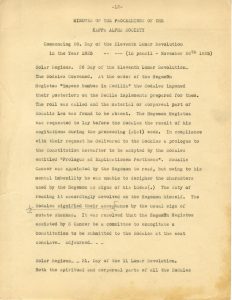Bingeing ‘Russian Doll’ is the best decision you’ll make this month
May 2, 2019
“It’s my bad attitude that keeps me young,” says Nadia Volvokov, the quick-witted protagonist of Netflix’s “Russian Doll,” which premiered on February 1. Since then, it has joined the ranks of other unexpected breakout hits from Netflix like “On My Block” and “You”, as well as earned overwhelmingly positive reception. At eight 25-minute episodes, the show is best described as a short existential drama, peppered heavily with acerbic humor conjured by and for disenchanted world citizens.
Starring Natasha Lyonne, a long-time fan favorite on Netflix’s “Orange is the New Black,” “Russian Doll” depicts one woman’s whirlwind journey as she relives her 36 birthday party, among other things, over and over. It shares elements of “Groundhog Day” and about a million sitcom episodes, but that’s where the similarities end. Lyonne’s character Nadia is a freewheeling software engineer with a penchant for dark clothing and winged eyeliner, whose life mission seems to be to have enough fun to drown out unresolved trauma from her childhood. At the beginning of the series, Nadia is taken hostage by a time loop that both causes her untimely deaths and guarantees her return to the bathroom of her friend’s apartment, in the middle of the party being thrown for her. To follow her to the end of the eight episodes is to embark on a brief and exhilarating foray into the void, and to emerge victorious.
Despite Netflix’s reputation for rapidly churning out new content, “Russian Doll” is seven years in the making. Lyonne is billed as a creator and executive producer for the show, along with Amy Poehler and Leslye Headland, director of 2015’s “Sleeping with Other People,” and together the three of them kept this project simmering until it was ready to be shared.
The result is a story with impeccable pacing and balance, acting simultaneously as an earnest drama and a no-holds-barred comedy. Lyonne and Poehler are known for their dry humor both on- and offscreen, so it’s no surprise that their unique approaches to comedy permeate the show’s dialogue, with quotable lines in every other scene. This, combined with the more fantastical elements of the plot, makes for lightheartedness that contrasts with some of the heavier subject matter and allows viewers to breathe in between dips underneath the surface.
As Nadia struggles to escape her loop, the audience becomes aware of other “traps” in her life: memories so troubling that emotional numbness is preferable to confronting them. Some see “Russian Doll” as a metaphor for addiction, child abuse or just trauma in general; the longer you try to run from your experiences and the behaviors they inspire, the more they will constrain you. The show makes a point of holding people accountable for toxic escapism while remaining empathetic to those in the throes of existential crisis.
While no one can be sure of the creators’ metaphoric intent, they certainly establish a morality for the show that elevates it beyond anything “Groundhog Day” could achieve.
Much of what I want to say about this show has been stated eloquently by other critics, but my contribution to the discourse is that “Russian Doll” is wholly therapeutic. The reason is simple: therapy of any kind is a periodic, non-surgical process that takes the form of an experience outside the one it attempts to explore. The show does just that, immersing you in a world where reconciliation and self-improvement are valued above all else, and can even decide the outcome of a life-or-death situation. We underestimate the need to place value on emotional catharsis. “Russian Doll” is a darkly humorous, East Village-chic reminder not to deny yourself the bliss of raw feeling. Above all, you are invited to look inwards — it might be the only way out.
I could write another whole article on this show’s soundtrack. Please go watch “Russian Doll.”






